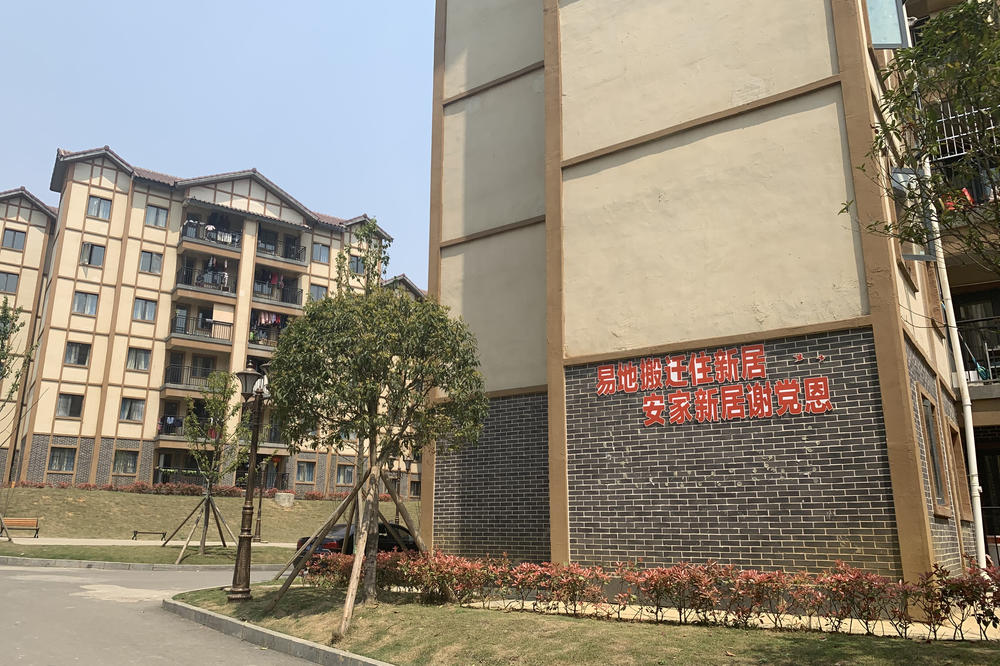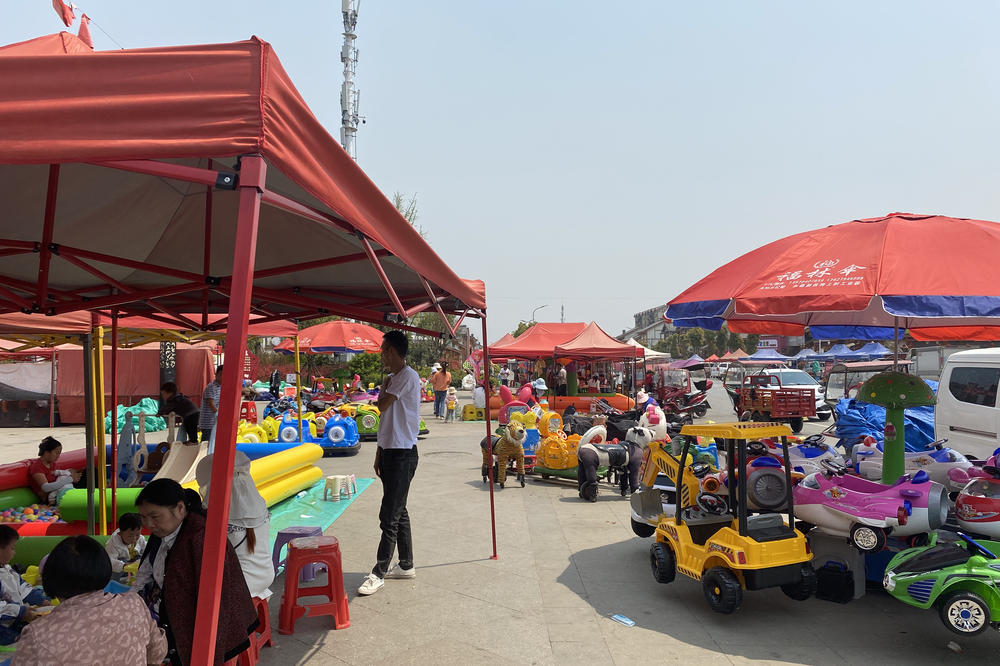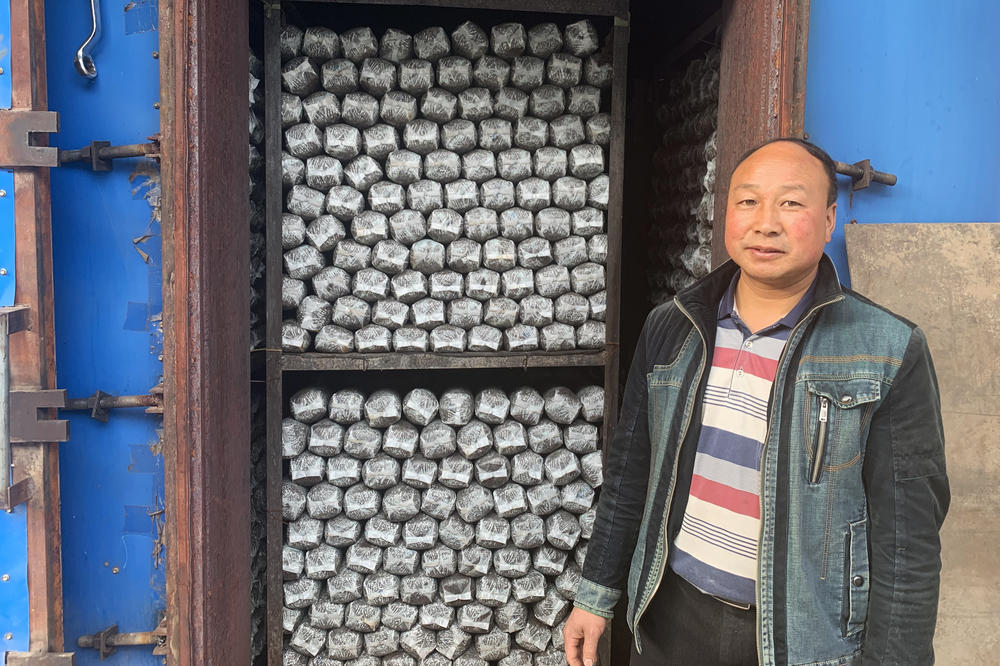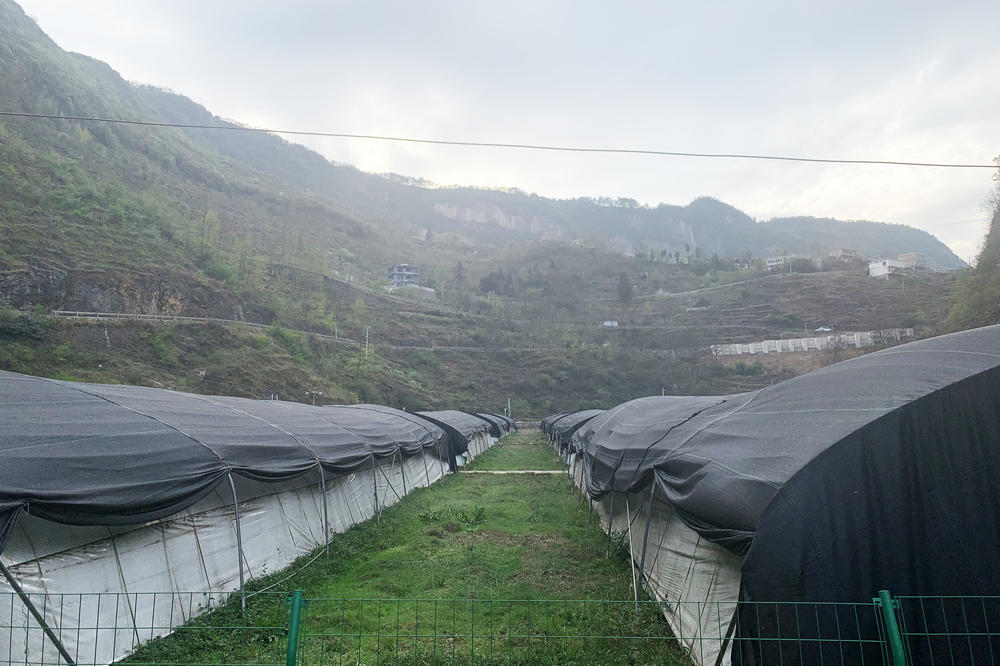Section Branding
Header Content
China Says It Has Ended Poverty. Is That True?
Primary Content
BIJIE, China – The Qixingguan community is designed to look like a socialist paradise. Identical rows of dozens of yellow apartment buildings, emblazoned with slogans expressing gratitude toward China's Communist Party, provide free living quarters for people once isolated in remote, mountainous villages. Near the complex, small garment factories were supposed to create jobs, and one of China's biggest real estate companies built two elementary schools.
But many of the complex's some 32,000 residents say they are still waiting for the life they were promised when the community launched in 2018.
"We were tricked," said Luo Beiling, who relocated her family to Qixingguan, a new district in Bijie, a city scattered in between mountains in Guizhou province, in 2018. She and other residents say commitments to provide good jobs never materialized, revealing how the sticky legacy of inequality – between China's affluent urban centers and its more rural outposts – remains.
Luo looked into moving back to her old house in the mountains, a three-hour drive away, where water was free and she could grow her own produce, but she found the village entirely demolished. "Now we are stuck here," she says, gesturing toward Qixingguan.
Many roads to prosperity
Luo and her new neighbors are recipients of a massive social reengineering project designed to tackle long-standing rural poverty. Starting in 2015, local governments have built more than 700,000 miles of roads, threading together once far-flung communities to more prosperous economic hubs.
To boost average incomes, China expanded its welfare system to give direct cash payments to rural retirees and those living below the poverty line. (China defines poverty as earning below RMB 4,000 a year, or around $600, a slightly lower threshold than the World Bank threshold for extreme poverty.)
Transforming mountainous Guizhou became a priority. Consistently the poorest province by per capita income, Guizhou has turned to everything from making rice liquor to building data farms in the last decade to raise wages. In 2019 alone, the province spent nearly RMB 1.8 trillion ($280 billion) on anti-poverty projects.
Nearly a quarter of that funding went to Guizhou's Bijie prefecture, where Qixingguan sits. The prefecture became infamous for extreme poverty in 2015 when a woman there poisoned her four children with pesticide before killing herself, writing she could no longer bear her family's dire financial condition.
What about jobs?
In November, China claimed victory. It announced that the entire country was now free of poverty. Soon after, Chinese leader Xi Jinping toured Bijie prefecture to inspect the results.
But a central issue in Qixingguan and other rural regions remains the lack of high-paying jobs, which are still overwhelmingly concentrated in China's coastal cities. Authorities are prioritizing rural employment and say this year, they are aiming to employ 30 million of the 100 million people they say they've newly brought out of poverty.
"Shifting poor people into cities can also be a way of reducing rural poverty, but it can come at the cost of increased urban poverty," says John Donaldson, an assistant professor at Singapore Management University who has written a book on anti-poverty efforts in Guizhou.
Having a steady income is particularly pressing for the nearly 10 million people, including those living in Qixingguan, who were relocated from rural villages into newly built townships and city districts during the anti-poverty campaign.
In the process, they suddenly acquired property, at no cost. Property has been a major source of urban wealth in the last four decades, but most rural residents had been excluded from accumulating such wealth because of ironclad restrictions on selling rural land.
But in trading their village homes for urban ones, Qixingguan's residents lost ready access to land they once used for subsistence farming in negotiations where consent was hazy.
"Even if you stayed in the mountains, your house would be bulldozed to nothing along with the rest of the village," says Zhong Jianhua, a recent college graduate who relocated with his entire village to Qixingguan.
Monthly welfare payments of RMB 300 ($45) for each adult were supposed to cushion the cost of moving, but residents say they never received any money.
Still, Zhong says he is happy with his family's new digs, where he lives with his parents and brother. His old village house was a fraction of the size of his new apartment. Driving out of the mountains to the nearest township took at least three hours. Public buses now ferry Qixingguan's residents for amenities such as shopping and entertainment — in less than half an hour.
"The problem is that everything here costs money," says Zhong, laughing ruefully.
That is precisely how authorities intended it, says Kristen Looney, an assistant professor at Georgetown University, where she studies rural development in China: "After the Asian financial crisis [in 1997], and especially after the global financial crisis a decade later, rural consumers came to be seen as the country's great untapped resource for economic growth.
"If these 100 million people can enter the middle-income group, their consumption will create huge potential [for economic growth]," Xia Gengsheng, vice director of a leadership group set up to oversee rural development, said at a government event on poverty alleviation in early April.
But for the plan to work, these people will need to find a new source of income other than social welfare payments or remittances from other family members. "Unless there are sufficient nonfarm jobs to support people in these newly urbanized villages, the math just won't add up for most people," Looney says.
Factory solutions
Seeking higher pay, Zhong left Bijie in April to pursue a factory job as many college graduates in China do, first in Fujian province, then Guangdong province. Both provinces, along China's eastern coast, have entrenched manufacturing hubs and offer higher pay than what Zhong could find in Guizhou.
The government has tried to move factories in big coastal cities to rural communities. Dozens of small-scale garment and home goods factories have already popped up next to Qixingguan, set up by manufacturers, mostly from Guangdong, seeking lower labor costs. China says it has built thousands of these "satellite factories'' directly in rural communities to offset the historical employment gap between coastal cities and poorer, inland regions.
"The pay is still too low," complained Zhang Zhengfu, a Qixingguan resident who sells fruit for a living. He says he gave up a well-paying job doing construction in coastal Zhejiang province and transferred his family back to Bijie to secure the free housing but has been dismayed at the average monthly salary at satellite factories – around RMB 2,000 a month (about $300) – which is about one-fifth of what he made before.
"I am still young, but I do not think I can leave this place now. This is what the rest of my life looks like," he says ruefully.
Guizhou is also looking into social cooperatives to provide employment. Funded by state bodies and private conglomerates, the co-ops are mostly in agriculture and directly owned and managed by rural residents, but they have historically not been effective.
"The track record is terrible, as most cooperatives are frauds. There are few authentic ones, and they really struggle," Singapore Management University's Donaldson says.
Mushrooming income
One of the more successful so far is the Hequan mushroom co-op, built with state and private investment but majority-owned by the villagers themselves.
"We used to plant corn, which was easy to grow but brought in very little money. Now one mushroom greenhouse can bring in up to $4,500," dozens of times the revenue per square meter corn once did, says Sun Dahui, the co-op manager.
The co-op runs about 40 black-tarped greenhouses built by Evergrande, one of China's biggest real estate developers, which also built at least two elementary schools in Luo's complex in Qixingguan.
During NPR's visit, some greenhouses were still steaming with the flowery smell of rice liquor, which Sun uses to disinfect equipment before inoculating logs of wood mulch with shiitake mushroom spores. The co-op now employs about 600 people in nearby villages.
Sun's biggest headache is that mushroom prices keep dropping. Two years ago, a kilogram sold for about RMB 16 ($2.50). Now prices have slid to around RMB 10 ($1.50), because all the nearby villages, inspired by Sun's example, are also growing mushrooms. The entire valley is blanketed with fungal greenhouses.
Sun thinks he can out-compete them. "We are building our own processing facility to make mushroom-based sauces. We are going to be the next Laoganma," a multimillion-dollar sauce brand, he tells NPR.
So it's not the government, but rather people such as the exuberant Sun who are now looking for ways to lift local incomes — and to keep people from sliding back into poverty.
NPR's Amy Cheng contributed research from Bijie.
Copyright 2021 NPR. To see more, visit https://www.npr.org.





